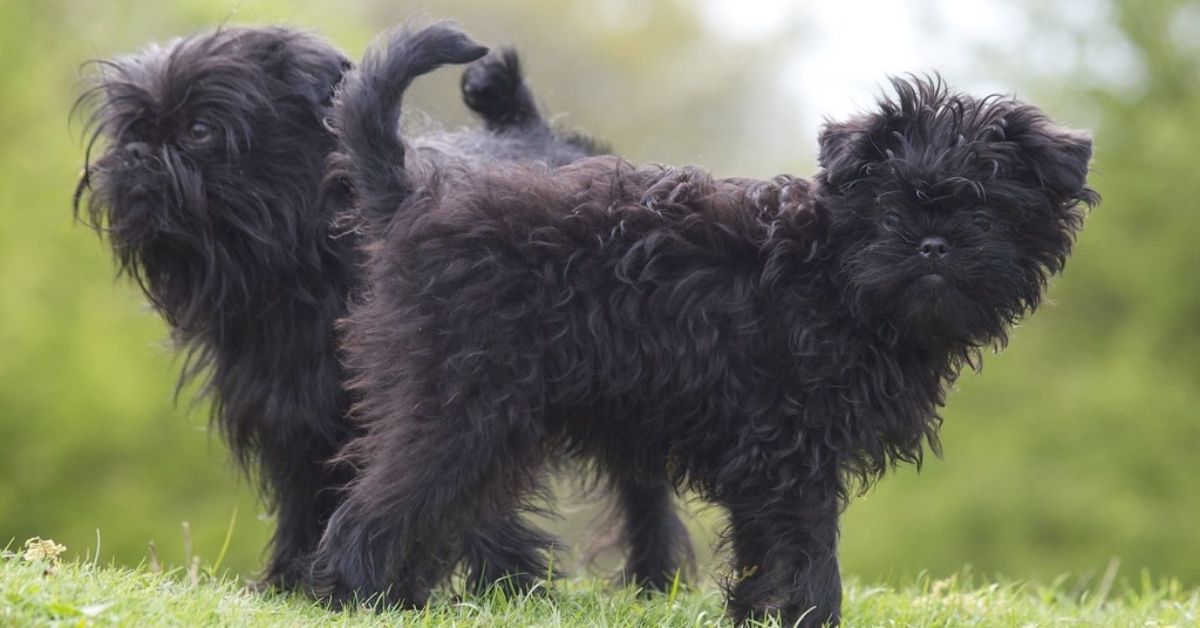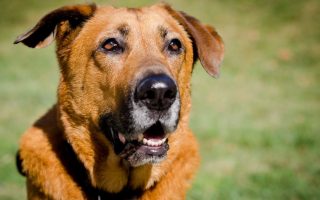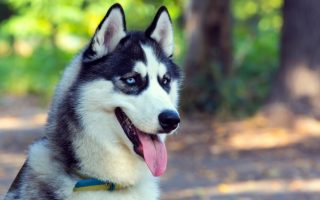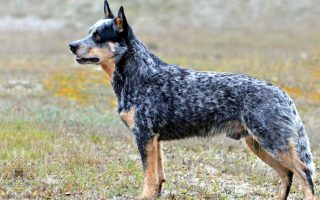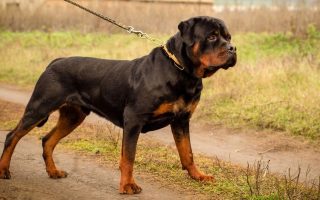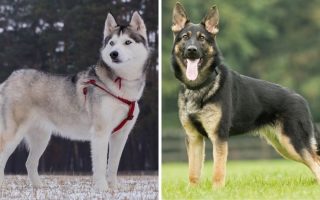A ratter from his early days, the Affenpinscher evolved to become a companion dog, first for ladies, then for the family.
The Affenpinscher is a household pet loved by many, with a face similar to a monkey and a small size.
Making a decision to have a pet is a big one as there are many factors to consider.
You need a dog that can fit into your living environment, family, lifestyle, and level of activity. It can get daunting, but information makes the process easier.
In this article, you will get to know all about Affenpinscher facts, dog breed information and answer the one question on every pet parent’s mind: Is the Affenpinschers the right dog for me, or should I look elsewhere?
Let’s dive right in.
Key Affenpinscher Facts & Information
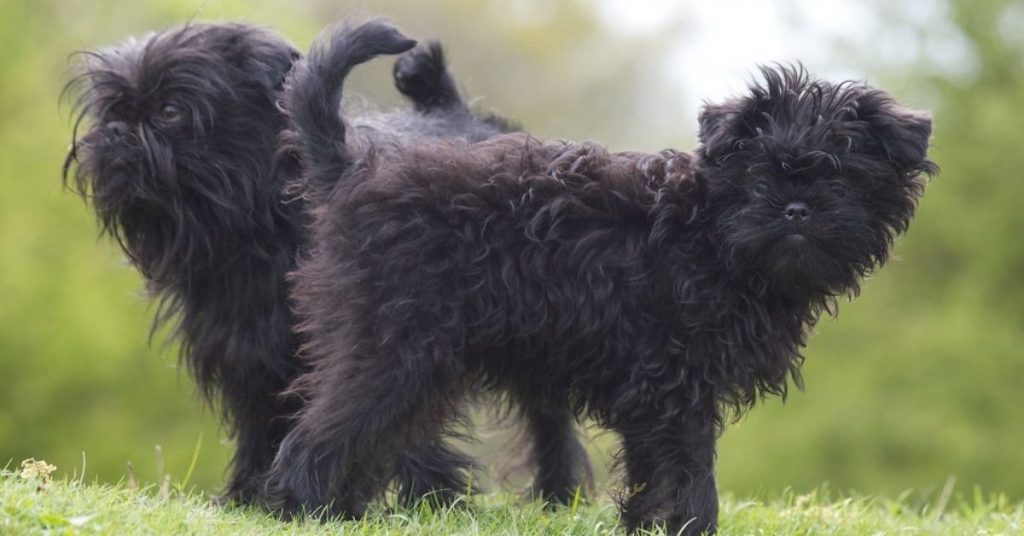
| Dog Breed Group | Companion Dogs |
| Breed Type | Purebred |
| Height | 9 to 11 inches |
| Weight | 7 to 9 pounds |
| Coat | Wire |
| Color(s) | Black, beige, grey, silver, tan, red |
| Life Expectancy | 12–14 years |
| Temperament | Affectionate, loyal, playful, energetic |
| Origin | Germany |
| Bred For | Catching rats |
| Nickname(s) | Monkey Terrier, the mustachioed little devil |
| Recognized by AKC | Yes |
| Recognized by UKC | Yes |
Affenpinscher Characteristics
| Characteristics | Rating |
|---|---|
| Adaptability | 3/5 |
| Friendliness | 3/5 |
| Kid-Friendly | 1/5 |
| Pet-Friendly | 4/5 |
| General Health | 4/5 |
| Grooming Needs | 5/5 |
| Trainability | 3/5 |
| Intelligence | 4/5 |
| Playfulness | 4/5 |
| Exercise Needs | 3/5 |
| Energy Level | 4/5 |
| Tendency to Bark | 2/5 |
| Tendency to Drool | 1/5 |
| Tendency to Snore | 1/5 |
| Tendency to Dig | 1/5 |
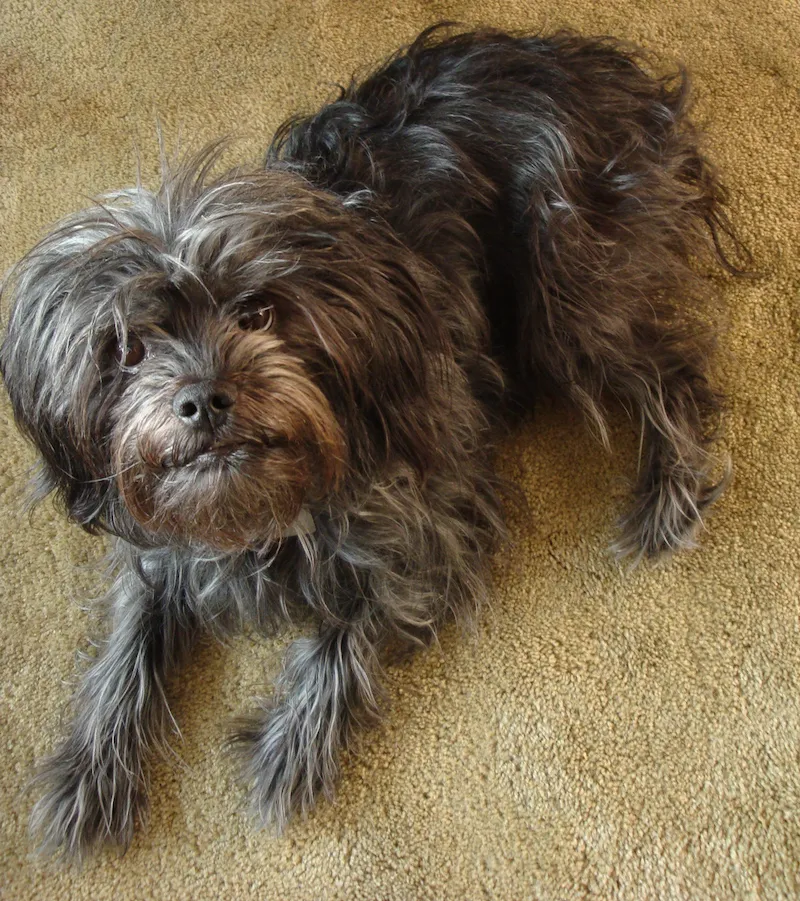
Little-known facts about Affenpinscher?
Fact #1: Affenpinschers are not good with young kids
Affenpinschers are loyal and protective to their families. Playful and compassionate, they are a delight to have around.
However, there are things they don’t take lightly. Affenpinschers love their toys and are not willing to share them.
They equally do not like being roughly handled or have their personal space breached.
If pushed against the wall, they may strike back by biting. This means that Affenpinschers are not good with small children.
While they are clowns who love human company, they do not have the gentleness and tolerance of kid-friendly dogs.
If you have very young children who have no idea what personal space is all about, avoid getting an Affenpinscher.
Fact #2: They make good watchdogs
If having a watchdog fancies you, the Affenpinscher is a good candidate. They are not quiet dogs and get agitated when faced with an unfamiliar person or event.\
You can know a stranger is approaching just by watching your dog react. It’s a good security measure.
Added to their excitable nature is their alertful bark. While barking is not appreciated by everyone, it serves as a signal for owners.
When your dog barks, he’s saying ‘watch out, I don’t recognize this person.’
Fact #3: Affenpinschers are not Terriers
Affenpinschers are often mistaken for Terriers. In fact, the name translates to ‘Monkey Terrier.’
This confusion stems both from the similar appearance and the hunting role Affenpinschers initially played. These traits make people assume they are Terriers.
Affenpinschers are actually classified under Pinschers, dogs whose main purposes were to hunt down rodents and fight.
That’s why your Affenpinscher can pick a fight twice the size. Other Pinschers include the Miniature Pinscher and German Pinscher.
Fact #4: Their pups are fragile
Affenpinschers display strength, confidence, and courage that’s more than their size.
They stand their ground in face of an attack and are ready to defend their families. However, we can’t say the same for their pups.
Just as babies come out looking so vulnerable you get scared of carrying them, Affenpinschers pups are fragile. They come out blind and need to be taken care of.
Affenpinschers give birth to about 3 puppies a year.
Fact #5: They don’t shed a lot
With an Affenpinscher, you don’t have to worry about getting fur all over your living room.
You don’t need to grab the vacuum cleaner anytime you step into the house.
Affenpinschers shed sometimes, but they are not regarded as constant shedders and are hypoallergenic.
Nevertheless, they require constant grooming to keep them clean. This is fortunately not a tasking job.
Breed History & Origin
The etymological meaning of Affenpinscher is “Monkey Terrier”. ‘Affen’ translates to monkey and ‘Pinscher’ to terrier.
Affenpinschers came from Germany and spread across central Europe with their reputation as ratters. Owners of stables, shops, farms, and houses with vermin situations welcomed them with open arms.
First sightings of this breed go as far back as the 15th, 17th, and 19th centuries with paintings and documentations revealing breeds way similar to the modern Affenpinscher.
A historical point to note is that the Affenpinscher was larger in his ratter days than now.
Only after some time were they bred in smaller size and became companions to ladies.
No one is quite sure what dogs were cross-bred to develop the Affenpinscher.
However, some sources cited Pugs, German Pinschers, and German Silky Pinschers.
Sadly, much of the work put into the breeding of the Affenpinscher has been lost to history.
What we do know is, they were central in the creation of breeds like the Brussel Griffon.
In 1913, the Berlin Lapdog Club adopted a breed standard and in 1936, the American Kennel Club recognized the breed.
While the Second World War hindered the breeding of the Affenpinscher, they are very much around, though relatively rare.
Affenpinscher Temperament & Intelligence
The Affenpinscher is as playful as he is loyal, with a streak of mischief to match.
They are active around the house, ready for an adventure, inquisitive about their environment, and strong-headed at times.
You must be firm with them as their stubbornness—mixed with high intelligence—can make training a tough task.
Their tendency to get bored can make them act in destructive ways, so you have to keep them occupied with different activities.
Due to their willingness to adapt, Affenpinschers make good travel companions.
They also love their families but are not the best options if you have children as they can be protective of their properties and may not be patient with kids.
With adults, they get along and are not aggressive except when provoked. They don’t stay calm in the face of danger.
They flow well with other dogs and can live in peace with pets like cats if trained properly.
However, their hunting instinct may mean that you should be careful, especially if you have a mouse or any other rodent in your household.
Despite their small size, they are ready to defend their family and will not back down from a fight.
You have to prevent them from getting into fights with bigger dogs as they may not stop, even with injuries.
Overall, a well-mannered Affenpinscher is loyal, funny, and entertaining to those around them.
Is an Affenpinscher a good family dog?
The Affenpinscher is loyal, defensive, and playful. These are good traits that make them great household pets. They are also funny and entertaining, so get ready for a good laugh while you are with them.
With proper training, they can coexist with other dogs and even cats. However, they may not be able to resist going after a rodent.
They equally rank low in kid-friendliness because they won’t hesitate to bite when provoked. It is best to have them in a household with older kids who can respect boundaries and not rough handle them.
Are Affenpinscher’s good with kids?
The Affenpinscher does not like to share his toys and playful objects. They also lack patience with the rough play kids do with dogs: yanking ears, pulling tails, and the likes.
Thus, if you have small children, do not consider getting an affenpinscher. They suit homes with teenagers and adults who know how to respect them.
Are Affenpinschers good with other dogs and pets?
When well trained, the Affenpinscher can do well with other dogs and pets. However, there are certain things to consider.
Despite their small size, they do not hesitate to fight a big dog and it can get extreme. You must prevent such confrontations.
Even when well trained, their hunting instinct can make them see cats as prey. Ditto for rodents.
Male vs Female Affenpinscher
The male and female of any breed come with a set of strengths and weaknesses. For most owners, gender is a matter of preference.
If you want to get your dog neutered, then gender should not be an issue for you.
However, if you prefer an unmetered pet, you may want to get information on the gender differences to make your choice easier.
There are very few differences in the weight and height of a male and female Affenpinscher. They both weigh 7 to 9 lbs and share a height of 10 inches.
The genitals are the first noticeable difference. In general, the male genitals of any dog breed are visible. This may be embarrassing for some people.
The challenge one may with the female Affenpinscher is the blood discharge that needs to be cleaned up.
The male Affenpinscher is also more laid-back and gets along with people better than the female Affenpinscher. However, the latter shows more compassion towards her loved ones.
Caring for an Affenpinscher
The Affenpinscher is an apartment dog, which is good for city dwellers, though you’d need to look out for his barking habits which can get on a neighbor’s nerves.
It is best to keep them in an enclosed area to stop them from running out or getting into fights with street dogs. Affenpinschers don’t mind taking on bigger dogs, regardless of size.
Like a lot of dogs, training this breed may be daunting. However, with patience, experience, and confidence, it is possible.
Affenpinscher Food and Diet
What you feed your dog is essential to growth, overall health, and fitness. You have to get the right diet and proportion to avoid them being either underweight or overweight.
Affenpinschers require a diet filled with beneficial nutrients. Do not simply scoop any food into his bowl.
Their little size and energy should be put into account when giving them their meals for the day.
This breed is okay with eating main meals twice a day, in small amounts to avoid indigestion.
In between, you can give them treats especially as a reward for training. They gain weight easy which you have to control by not overfeeding them.
Certain nutrients are good for your affenpinscher and come highly recommended. Some of these nutrients are:
- Protein
- Healthy fat
- Bone
- Vegetable
Puppies and adult dogs do not have the same meal requirements, just like human adults don’t eat like babies. Thus, do not feed a puppy the way you would an adult.
The Affenpinscher puppy at 8 to 12 weeks needs up to four main meals which reduce to 3 meals when they get to six months. Once your affenpinscher gets to 8-10 months, you can switch their meal.
The old affenpinscher requires lesser than both puppies and young adults. Their meal should consist of a lot of fiber and minerals and be given twice a day at a lesser quantity than the younger affenpinscher.
Check out this article on the worst foods for dogs.
Affenpinscher Exercise
Regular exercise is necessary for your dog, no matter what personality they have.
As humans exercise to keep fit, healthy, and look good, dogs need to work out their bodies.
For some dogs, lack of exercise can get them antsy. The result of this is havoc on your belongings. Even if your dog isn’t so energetic, they need exercise.
Some dogs have a high exercise need going up to 30 minutes or an hour. Others are content with simple movements after which they lie down for the rest of the day.
Before choosing a dog, you have to know whether you can cope with the exercise needs. Of course, this depends on your lifestyle, personality, and work demands.
The Affenpinscher needs at least 30 minutes of daily exercise as they are energetic and need an outlet.
Daily walks, mental activities, and games are some ways you can exercise your affenpinscher. They like toys too and love to play around with them.
Puppies need a different exercise regime. With them, long walks are unnecessary and should be avoided until they get up to 3 months. Give them toys for a start.
Older dogs don’t need as much exercise as younger ones, but you still have to keep them fit. This helps them control weight and avoid joint pains.
A dog is a man’s best friend, but only when they are trained. When they lack training, they become dangerous to everyone.
Even a gentle breed can turn wild. Thus, before you get a dog, you need to answer these few questions:
- Do you have the time to commit to your dog’s upbringing?
- Are you experienced enough?
- Can the breed be a domestic pet?
- How trainable is your favourite breed?
Also, know how to distinguish training from abuse. While you need confidence and strictness to teach your dog good manners, harsh treatments and punishments are not necessary and may do more harm than good.
Socialization is a must for any dog. Take them to different places and unwrap the world.
Let them meet new people, get accustomed to unfamiliar sights, smell unknown scents and be friendly.
With the Affenpinscher, variety is the spice of training. They are agile and get bored quickly, so you have to make training fun by diversifying it.
Also, learn to put them on a leash before you can consider setting them free because they tend to bolt off after prey. Motivations and rewards for good work go a long way in getting your Affenpinscher to co-operate.
They can be stubborn and may not obey instructions, so you need patience coupled with consistency.
Affenpinscher Grooming Needs
Alongside other needs, your dog has to be neat and presentable. It says a lot of negative things about you if your dog comes out looking shabby, unruly, and dirty.
Some dogs shed a lot, others don’t. Either way, they should be groomed.
If you have the experience and time, you may do it yourself. If not, consider hiring a groomer to get the job done.
The Affenpinscher can easily pull off a ‘shaggy but cool’ look, which is a preferred option when grooming. Here are some steps to achieve this:
- Get a slicker brush.
- Remove debris, knots and other dirts from their coat.
- Comb the coat with a greyhound comb.
- Break up tangles to achieve smoothness.
With the help of a breeder and practice, it becomes easier.
Their teeth and nails shouldn’t be neglected too. Make sure you brush their teeth daily and trim their nails before they get too long.
Grooming an Affenpinscher should begin as a puppy to get them used to it. It takes time for any dog to allow someone to touch them enough to start grooming.
An early start goes a long way. Positive reinforcements and rewards are necessary too.
If you detect signs of infection, illness, or injury while you groom, get your dog to the vet. Some telltale signs include:
- Sores
- Inflammation
- Red eyes
- Rashes
Affenpinscher Health Conditions
Sadly, illness is a part of life, both for humans and furries. When you get a pet, it is important you check to be sure the animal is healthy and to keep in mind possible medical conditions.
The Affenpinscher, when you take care of them, live long and stay healthy. However, they are prone to illnesses like:
Hip dysplasia
This is an inherited condition that goes straight to the hips, causing pains and can lead to lameness. When getting an Affenpinscher, be sure your breed is not susceptible to this issue.
Heart murmurs
This is a cardiological problem that affects many dog breeds, including the Affenpinscher. Blood flow problems through the heart are the main cause of heart murmurs.
Patellar Luxation
Patellar Luxation leads to lameness, limping, and an abnormal posture. It often is present when the dog is a puppy. Small dogs are prone to this condition.
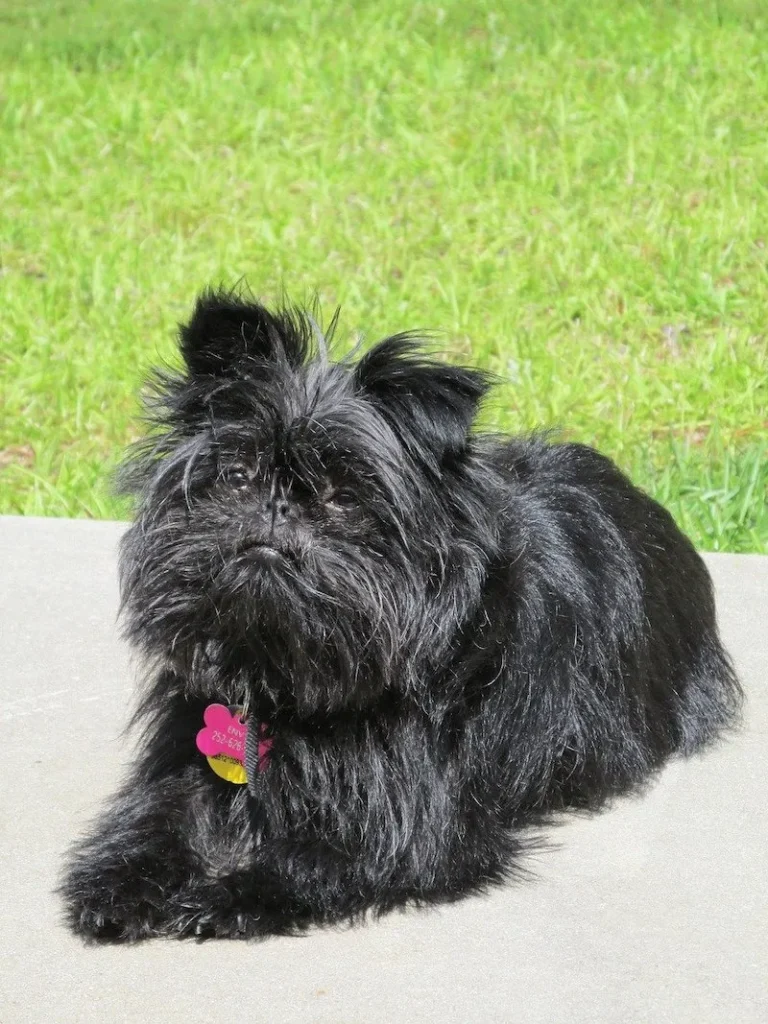
Frequently Asked Questions
Is an Affenpinscher right for you?
Affenpinschers are loyal, funny, and playful with their families. They make good companions, can adapt to the indoors, and even help people heal from emotional issues.
You should, however, consider your lifestyle and family to know if the Affenpinscher is good for you.
What are Affenpinschers known for?
Historically, Affenpinschers were bred as ratters and still have that instinct today. They were also known as lapdogs for ladies and are solid family pets for those who can handle them.
How big is a full-grown Affenpinscher?
An Affenpinscher, when fully grown, goes up to 9 pounds with a height of 11 inches.
Do Affenpinschers like to cuddle?
Affenpinschers are good lapdogs that you can draw into a hug and cuddle. Having said that, they do not like to be confined in one position for long. They prefer moving around.
Is it hard to take care of an Affenpinscher?
Affenpinschers don’t shed, making it less stressful to take care of them. They do require enough grooming which takes time and effort. You may choose to do that on your own or hire a groomer
How Long do Affenpinschers live?
Affenpinschers live a relatively long life which is good news as you get to spend time with them. Besides health complications, they have a life span of 12 to 14 years.
How Much are Affenpinschers?
Affenpinschers are rare and costly. Your choice of pedigree determines how much you spend to get one. Puppy prices range from $1000 to $3000. A grown dog is at $500 to $1000. Ensure you find a responsible breeder.
Do Affenpinschers shed?
Affenpinschers shed in some seasons. However, they are known to be dogs who hardly shed. You do not have to worry about your house getting filled with fur.
Final Thoughts
The Affenpinscher is a breed with strengths, needs, and challenges. Like any other breed, they deserve your love and commitment to training them into dogs that fit into society.
With these Affenpinscher facts and dog breed information, it shouldn’t be difficult for you to decide whether or not the Affenpinscher is the right dog for you.
If you do believe you can handle owning one, consider adopting from shelters. Those little furry babies need a home.
Related: Complete Alphabetical List of Dog Breeds
Helpful Resources
- Official Breed Clubs: Affenpinscher Club of America, The Affenpinscher Club UK
- AKC Official Profile: Affenpinscher Dog Breed Information
- Breed Standards: The Official Standard of the Affenpinscher in –
- AKC (United States)
- The Kennel Club (United Kingdom)
- ANKC (Australia)
- Find a Puppy: Rescue/Find an Affenpinscher puppy –
- AKC Marketplace (United States)
- The Kennel Club (United Kingdom)
- Dogs NSW (Australia)

